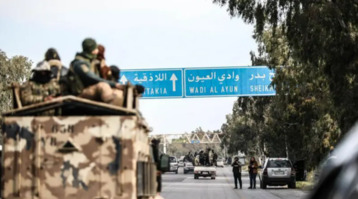-
Iraq’s PM urges protesters to stop, says unrest is hurting the economy

Iraq’s Prime Minister Adil Abdul-Mahdi appealed on Sunday to protesters to help restore normal life across the country and said the unrest was costing the economy “billions of dollars.”
More than 250 people have been killed since the protests in Baghdad and the south of the country started in early October, driven by discontent over economic hardship and corruption.
In statement published on Sunday evening, Abdul-Mahdi said the protests which “shook the political system” have achieved their purpose and must stop effecting the country’s trade and economic activities.
“Threatening the oil interests and blocking roads leading to Iraq’s ports is causing big losses exceeding billions of dollars,” said Abdul Mahdi, warning that unrest was pushing up prices of goods.
Operations at Iraq’s main Gulf port, Umm Qasr, near the oil-rich city of Basra, which receives the bulk of Iraq's imports of grain, vegetable oils and sugar, have been at a complete standstill since Wednesday.
Thousands of protesters have blocked all roads leading to the port. Police on Saturday used live fire and tear gas to try and disperse protesters and open the roads leading to the port but they failed to force them to leave.
The protests have broken nearly two years of relative stability in Iraq.
Despite the country’s oil wealth, many people live in poverty with limited access to clean water, electricity, healthcare or education.
Student strikes, street closures
Protesters in Iraq’s capital and its south shut down streets, schools and government offices on Sunday, AFP’s correspondents said, escalating the month-long movement demanding change to the country’s political system.
Meanwhile, more than a thousand demonstrators clashed with Iraqi security forces in front of the Iranian consulate in Karbala, according to Al Arabiya’s correspondent.
Security forces later dispersed the protesters in front of the Iranian consulate and secured the building.
In Baghdad, university-age demonstrators parked cars in the middle of main thoroughfares, blocking traffic on the first day of the work week.
Police officers manning nearby checkpoints looked on but did not intervene.
Other students took part in sit-ins at their schools, and the country’s national teachers union extended the strike they began last week.
The engineering, doctors and lawyers syndicates have all backed the protests.
In Kut to the east, protesters sealed off main roads and bridges and most schools and government agencies were shut.
“We decided to cut the roads as a message to the government that we will keep protesting until the corrupt people and thieves are kicked out and the regime falls,” said Tahseen Nasser, a 25-year-old protester.
“We’re not allowing government workers to reach their offices, just those in humanitarian fields,” including hospitals and police officers, he said.
Further south in Hillah, Nasiriyah, Diwaniyah and the holy city of Karbala most government offices were not open.
And in Basra, the oil-rich port city, public schools were shut down for the first time since the movement erupted last month.
Demonstrations broke out in Baghdad on October 1 in outrage at unemployment, poor public services and corruption, quickly spreading to the Shiite-majority south.
The activists were confronted by security forces, and 157 people - most of them demonstrators in Baghdad - were killed in six days of rallies.
But the protests resumed on October 24 and quickly swelled with the support of students, who skipped class to protest despite orders from Iraq’s higher education minister to stay away from the rallies.
source:Reuters
You May Also Like
Popular Posts
Caricature
BENEFIT AGM approves 10%...
- March 27, 2025
BENEFIT, the Kingdom’s innovator and leading company in Fintech and electronic financial transactions service, held its Annual General Meeting (AGM) at the company’s headquarters in the Seef District.
During the meeting, shareholders approved all items listed on the agenda, including the ratification of the minutes of the previous AGM held on 26 March 2024. The session reviewed and approved the Board’s Annual Report on the company’s activities and financial performance for the fiscal year ended 31 December 2024, and the shareholders expressed their satisfaction with the company’s operational and financial results during the reporting period.
The meeting also reviewed the Independent External Auditor’s Report on the company’s consolidated financial statements for the year ended 31 December 2024. Subsequently, the shareholders approved the audited financial statements for the fiscal year. Based on the Board’s recommendation, the shareholders approved the distribution of a cash dividend equivalent to 10% of the paid-up share capital.
Furthermore, the shareholders endorsed the allocation of a total amount of BD 172,500 as remuneration to the members of the Board for the year ended 31 December 2024, subject to prior clearance by related authorities.
The extension of the current composition of the Board was approved, which includes ten members and one CBB observer, for a further six-month term, expiring in September 2025, pending no objection from the CBB.
The meeting reviewed and approved the Corporate Governance Report for 2024, which affirmed the company’s full compliance with the corporate governance directives issued by the CBB and other applicable regulatory frameworks. The AGM absolved the Board Members of liability for any of their actions during the year ending on 31st December 2024, in accordance with the Commercial Companies Law.
In alignment with regulatory requirements, the session approved the reappointment of Ernst & Young (EY) as the company’s External Auditors for the fiscal year 2025, covering both the parent company and its subsidiaries—Sinnad and Bahrain FinTech Bay. The Board was authorised to determine the external auditors’ professional fees, subject to approval from the CBB, and the meeting concluded with a discussion of any additional issues as per Article (207) of the Commercial Companies Law.
Speaking on the company’s performance, Mr. Mohamed Al Bastaki, Chairman BENEFIT , stated: “In terms of the financial results for 2024, I am pleased to say that the year gone by has also been proved to be a success in delivering tangible results. Growth rate for 2024 was 19 per cent. Revenue for the year was BD 17 M (US$ 45.3 Million) and net profit was 2 Million ($ 5.3 Million).
Mr. Al Bastaki also announced that the Board had formally adopted a new three-year strategic roadmap to commence in 2025. The strategy encompasses a phased international expansion, optimisation of internal operations, enhanced revenue diversification, long-term sustainability initiatives, and the advancement of innovation and digital transformation initiatives across all service lines.
“I extend my sincere appreciation to the CBB for its continued support of BENEFIT and its pivotal role in fostering a stable and progressive regulatory environment for the Kingdom’s banking and financial sector—an environment that has significantly reinforced Bahrain’s standing as a leading financial hub in the region,” said Mr. Al Bastaki. “I would also like to thank our partner banks and valued customers for their trust, and our shareholders for their ongoing encouragement. The achievements of 2024 set a strong precedent, and I am confident they will serve as a foundation for yet another successful and impactful year ahead.”
Chief Executive of BENEFIT; Mr. Abdulwahed AlJanahi commented, “The year 2024 represented another pivotal chapter in BENEFIT ’s evolution. We achieved substantial progress in advancing our digital strategy across multiple sectors, while reinforcing our long-term commitment to the development of Bahrain’s financial services and payments landscape. Throughout the year, we remained firmly aligned with our objective of delivering measurable value to our shareholders, strategic partners, and customers. At the same time, we continued to play an active role in enabling Bahrain’s digital economy by introducing innovative solutions and service enhancements that directly address market needs and future opportunities.”
Mr. AlJanahi affirmed that BENEFIT has successfully developed a robust and well-integrated payment network that connects individuals and businesses across Bahrain, accelerating the adoption of emerging technologies in the banking and financial services sector and reinforcing Bahrain’s position as a growing fintech hub, and added, “Our achievements of the past year reflect a long-term vision to establish a resilient electronic payment infrastructure that supports the Kingdom’s digital economy. Key developments in 2024 included the implementation of central authentication for open banking via BENEFIT Pay”
Mr. AlJanahi concluded by thanking the Board for its strategic direction, the company’s staff for their continued dedication, and the Central Bank of Bahrain, member banks, and shareholders for their valuable partnership and confidence in the company’s long-term vision.
opinion
Report
ads
Newsletter
Subscribe to our mailing list to get the new updates!





















